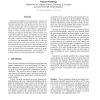Free Online Productivity Tools
i2Speak
i2Symbol
i2OCR
iTex2Img
iWeb2Print
iWeb2Shot
i2Type
iPdf2Split
iPdf2Merge
i2Bopomofo
i2Arabic
i2Style
i2Image
i2PDF
iLatex2Rtf
Sci2ools
112
click to vote
ICMAS
2000
2000
The Computational Complexity of Agent Design Problems
This paper investigates the computational complexity of a fundamental problem in multi-agent systems: given an environment together with a specification of some task, can we construct an agent that will successfully achieve the task in the environment? We refer to this problem as agent design. Using an abstract formal model of agents and their environments, we begin by investigating various possible ways of specifying tasks for agents, and identify two important classes of such tasks. Achievement tasks are those in which an agent is required to bring about one of a specified set of goal states, and maintenance tasks are those in which an agent is required to avoid some specified set of states. We prove that in the most general case the agent design problem is PSPACE-complete for both achievement and maintenance tasks. We briefly discuss the automatic synthesis of agents from task environment specifications, and conclude by discussing related work and presenting some conclusions.
Related Content
| Added | 01 Nov 2010 |
| Updated | 01 Nov 2010 |
| Type | Conference |
| Year | 2000 |
| Where | ICMAS |
| Authors | Michael Wooldridge |
Comments (0)

